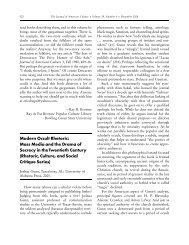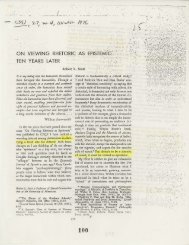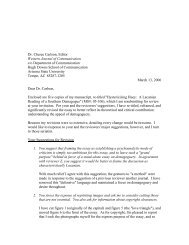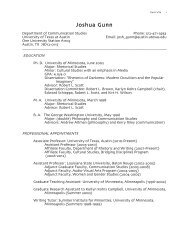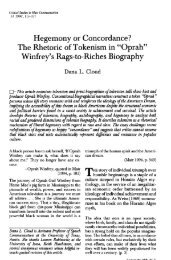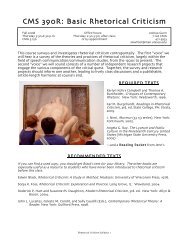The Rhetoric and Death of U.S. Freemasonry In this essay I argue ...
The Rhetoric and Death of U.S. Freemasonry In this essay I argue ...
The Rhetoric and Death of U.S. Freemasonry In this essay I argue ...
You also want an ePaper? Increase the reach of your titles
YUMPU automatically turns print PDFs into web optimized ePapers that Google loves.
<strong>Death</strong> <strong>of</strong> <strong>Freemasonry</strong> 21<br />
ultimately reality (<strong>and</strong> even then, only partially). 46 From <strong>this</strong> perspective, the "esoteric<br />
work" <strong>of</strong> oral memorization to learn the Masonic catechism <strong>of</strong> each degree is not only a<br />
device for secrecy, but a practice wedded to a faith in the spirituality <strong>of</strong> presentism. 47<br />
<strong>The</strong> Platonic belief that speech presences thought <strong>and</strong> is therefore closer to<br />
spiritual truth bespeaks the centrality <strong>of</strong> drama, or the physical interaction <strong>of</strong> people in<br />
a staged ritual or performance. For these reasons, many prominent Masons have<br />
<strong>argue</strong>d that the teachings <strong>of</strong> the Craft are derived from "<strong>The</strong> Mysteries," which are<br />
either a descendant <strong>of</strong> Platonism or at least originally based on the same ideas Plato<br />
harbored about the divine <strong>and</strong> our access to it. 48<br />
Hutchens explains that<br />
<strong>The</strong> Ancient Mysteries were secret ceremonies which used drama,<br />
symbolism, <strong>and</strong> mythology to transmit religious <strong>and</strong> philosophical<br />
knowledge to selected initiates. . . . <strong>The</strong> parallels between <strong>Freemasonry</strong><br />
<strong>and</strong> the Ancient Mysteries are evidenced by their similar objectives <strong>and</strong><br />
methods. Through symbolism, mythology <strong>and</strong> drama, the Mysteries<br />
taught that man's soul was immortal <strong>and</strong> that virtue, not vice, provides<br />
the hope <strong>of</strong> immortality. 49<br />
Whether or not one can trace <strong>Freemasonry</strong> as a direct descendent <strong>of</strong> <strong>The</strong> Mysteries is<br />
not as important as reckoning with their common cause in the important function <strong>of</strong><br />
secrecy/mystery as a route to spiritual knowledge. <strong>In</strong> one <strong>of</strong> the largest <strong>and</strong> most<br />
difficult works <strong>of</strong> Masonic philosophy, Morals <strong>and</strong> Dogma <strong>of</strong> the Ancient <strong>and</strong> Accepted<br />
Scottish Rite <strong>of</strong> <strong>Freemasonry</strong>, which is a collection <strong>of</strong> "lectures" about both the Blue<br />
Lodge <strong>and</strong> Scottish Rite degrees, Albert Pike stresses the function <strong>of</strong> secrecy in the<br />
Mysteries was to create spiritual <strong>and</strong> intellectual curiosity, as well as respect for the<br />
teachings <strong>of</strong> the organization:



